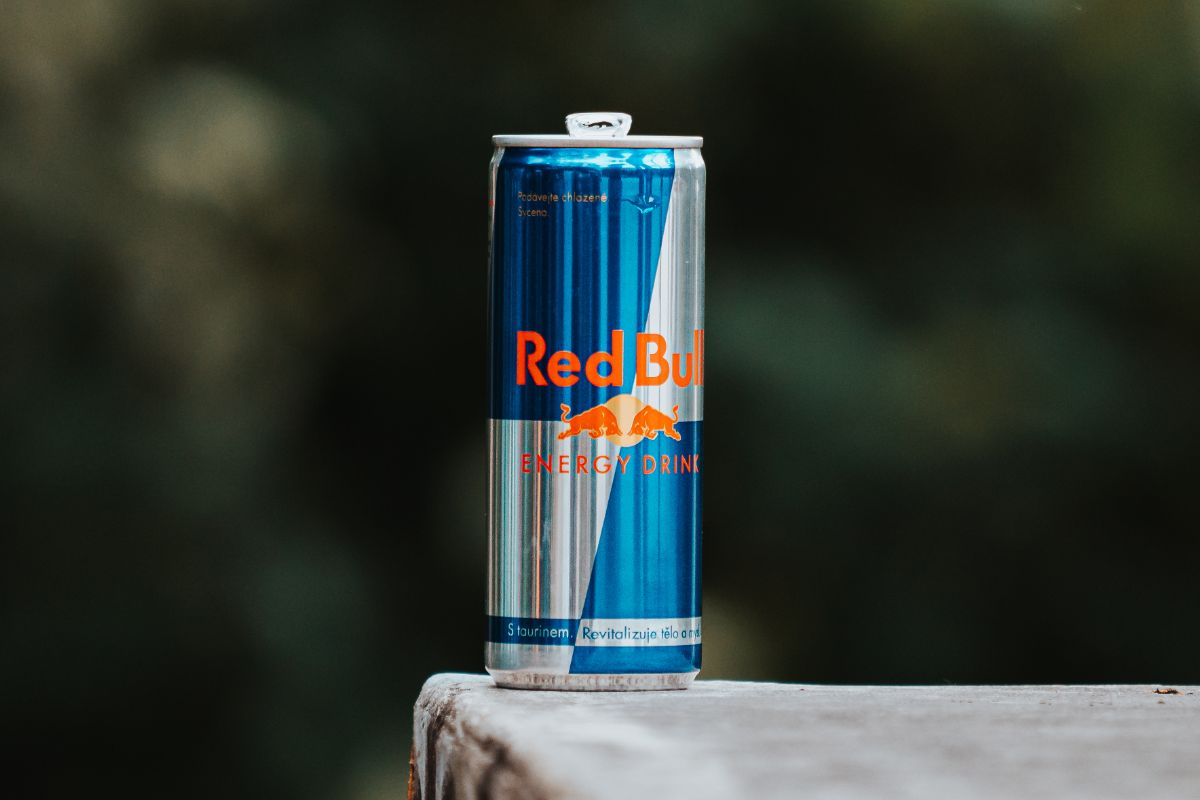Red Bull is a popular energy drink that has become a staple in many people’s lives, especially those who need a quick boost of energy and focus to power through their day.

However, with the growing concern over the ingredients and health effects of energy drinks, it’s important to understand what you’re consuming and its potential impact on your health.
This comprehensive guide will explore what Red Bull tastes like, its ingredients, and the health considerations you should keep in mind when consuming it.
We’ll dive into the unique flavor profile of Red Bull, including its combination of sweet and tart notes, as well as its distinct aftertaste.
We’ll also take a closer look at the ingredients that make up Red Bull, including caffeine, taurine, sugar or artificial sweeteners, and a variety of B vitamins.
These ingredients work together to provide a quick boost of energy and focus, but they can also have potential health effects that you should be aware of.
In addition to discussing the taste and ingredients of Red Bull, we’ll also delve into the potential health considerations that come with consuming this popular energy drink.
We’ll examine the recommended daily limit for caffeine intake, as well as the potential side effects of consuming too much caffeine or taurine.
By the end of this guide, you’ll have a better understanding of what Red Bull tastes like, what it’s made of, and the potential health implications of consuming it.
Armed with this knowledge, you’ll be better equipped to make informed decisions about whether or not Red Bull is the right choice for you.
History Of Red Bull
The history of Red Bull dates back to 1984 when Austrian entrepreneur Dietrich Mateschitz discovered a popular energy drink called Krating Daeng while on a business trip to Thailand.
Krating Daeng was a Thai energy drink that was designed to help truck drivers and laborers stay awake and alert.
Mateschitz was intrigued by the drink’s potential and teamed up with the creator of Krating Daeng, Chaleo Yoovidhya, to create a new energy drink for the Western market.
The two developed a new formula for the drink, which was specifically designed to appeal to Western tastes. In 1987, Red Bull was introduced to the Austrian market, and it quickly became a sensation.
The drink’s distinctive taste and energy-boosting properties proved to be a hit with consumers, and it wasn’t long before Red Bull started to expand into other markets around the world.
Over the years, Red Bull has become one of the most popular energy drinks in the world, with a presence in over 170 countries.
The brand has also become known for its involvement in extreme sports and other high-energy activities, sponsoring events like the Red Bull Air Race, Red Bull Rampage, and Red Bull Crashed Ice.
Today, Red Bull is a global brand with a significant following, and it continues to be a leader in the energy drink industry.
What Does Red Bull Taste Like?

Red Bull has a unique flavor profile that is often described as a combination of sweet and tart notes, with a slightly bitter aftertaste.
The sweetness comes from the addition of sugar or artificial sweeteners, while the tartness comes from the inclusion of citric acid, which gives the drink its signature sour flavor.
The combination of sweet and tart flavors makes Red Bull a refreshing and thirst-quenching beverage. It’s also worth noting that the level of sweetness can vary depending on the specific flavor of Red Bull you are consuming.
For example, the regular Red Bull flavor is generally considered to be sweeter than the Sugarfree version, which uses artificial sweeteners instead of sugar.
Overall, the flavor profile of Red Bull is unique and appealing to many. It’s the perfect combination of sweetness and tartness, making it a great choice for those who want a quick boost of energy and focus in a refreshing and flavorful beverage.
Red Bull Ingredients
The main ingredients in Red Bull include:
- Caffeine: Red Bull contains caffeine, a stimulant that is commonly found in coffee and tea. Caffeine is known for its ability to enhance alertness, focus, and cognitive function.
- Taurine: Taurine is an amino acid that is naturally found in the human body. It’s also found in some foods, such as meat and fish.
Taurine is believed to have a variety of health benefits, including the ability to improve exercise performance and reduce fatigue.
- Sugar or Artificial Sweeteners: Red Bull contains sugar or artificial sweeteners, depending on the specific flavor. The regular Red Bull flavor contains sugar, while the Sugarfree version uses artificial sweeteners such as aspartame and acesulfame K.
- B Vitamins: Red Bull contains several B vitamins, including niacin (B3), pantothenic acid (B5), vitamin B6, and vitamin B12. These vitamins play a crucial role in energy metabolism and cognitive function.
- Water: Water is the main ingredient in Red Bull, making up the majority of the beverage.
It’s worth noting that Red Bull also contains trace amounts of other ingredients, including citric acid, sodium bicarbonate, and magnesium carbonate. These ingredients help to regulate the acidity of the beverage and improve its taste and texture.
While these ingredients work together to provide a quick burst of energy and focus, it’s important to keep in mind that they can also have potential health effects, especially when consumed in excess.
It’s recommended to consume Red Bull in moderation and to be aware of the recommended daily limit for caffeine intake.
Health Considerations Of Red Bull
While Red Bull can provide a quick boost of energy and focus, it’s important to be aware of the potential health considerations associated with its consumption.
- Caffeine: One of the primary concerns associated with Red Bull is its caffeine content.
The regular 8.4-ounce can of Red Bull contains approximately 80mg of caffeine, while the Sugarfree version contains approximately 80mg per 12-ounce can.
Consuming too much caffeine can lead to jitters, anxiety, headaches, and difficulty sleeping. It’s recommended to limit caffeine intake to no more than 400mg per day for most healthy adults.
- Taurine: While taurine is generally considered safe, there is limited research on the long-term effects of consuming large amounts of taurine.
Some studies have suggested that consuming high doses of taurine may increase the risk of heart disease.
- Sugar or Artificial Sweeteners: Red Bull contains sugar or artificial sweeteners, depending on the specific flavor.
Consuming too much sugar can lead to weight gain, while consuming too many artificial sweeteners may have negative health effects, including digestive issues and an increased risk of certain diseases.
- B Vitamins: While B vitamins are essential for energy metabolism and cognitive function, consuming excessive amounts of these vitamins can lead to negative health effects, including nerve damage and skin flushing.
- Other ingredients: Red Bull also contains trace amounts of other ingredients, including citric acid and sodium bicarbonate. While these ingredients are generally considered safe, consuming too much citric acid may lead to dental erosion.
It’s important to consume Red Bull in moderation and to be aware of the potential health implications associated with its consumption. If you have any concerns about consuming Red Bull, it’s recommended to speak with your healthcare provider.
Who Is Red Bull Not Safe For?
While Red Bull is generally safe for most healthy adults when consumed in moderation, there are some groups of people who should be cautious or avoid consuming Red Bull altogether.
- Children: Red Bull is not recommended for children or adolescents, as their bodies are still developing, and excessive caffeine intake may lead to negative health effects, including anxiety, sleep disturbances, and rapid heartbeat.
- Pregnant and breastfeeding women: It’s recommended that pregnant and breastfeeding women limit their caffeine intake to no more than 200mg per day.
Consuming excessive amounts of caffeine during pregnancy may increase the risk of miscarriage, premature birth, and low birth weight.
- People with caffeine sensitivity: Some people may be more sensitive to the effects of caffeine than others. If you are sensitive to caffeine, consuming Red Bull may lead to negative health effects, including jitters, anxiety, and difficulty sleeping.
- People with certain health conditions: People with certain health conditions, including high blood pressure, heart disease, and anxiety disorders, should be cautious about consuming Red Bull, as the caffeine content may exacerbate their symptoms.
- People taking certain medications: Some medications, including certain antibiotics, antidepressants, and blood thinners, may interact with caffeine and increase the risk of negative health effects.
It’s important to speak with your healthcare provider if you have any concerns about consuming Red Bull or any other caffeinated beverage. They can provide guidance on safe caffeine intake based on your individual health status and medications.
Final Thoughts
Red Bull is a popular energy drink that has gained a significant following since its introduction in 1987. It is known for its distinctive taste, which is a combination of sweet and sour flavors.
The primary ingredients in Red Bull include caffeine, taurine, sugar, and B vitamins, which are all designed to provide an energy boost to consumers.
While Red Bull may provide a quick burst of energy, it is important to consider the potential health risks associated with consuming energy drinks.
Excessive consumption of Red Bull or other energy drinks can lead to a range of health problems, including heart palpitations, high blood pressure, and anxiety.
Therefore, it is important to consume Red Bull and other energy drinks in moderation and be mindful of the potential health risks.
Overall, Red Bull is a popular energy drink that can provide a quick energy boost but should be consumed responsibly, alongside a balanced diet and active lifestyle.
- How To Reheat A Cheesesteak - November 5, 2023
- What Are Three Must Have Kitchen Knives? - September 22, 2023
- How To Protect Edges Of Pie Crust - June 15, 2023








